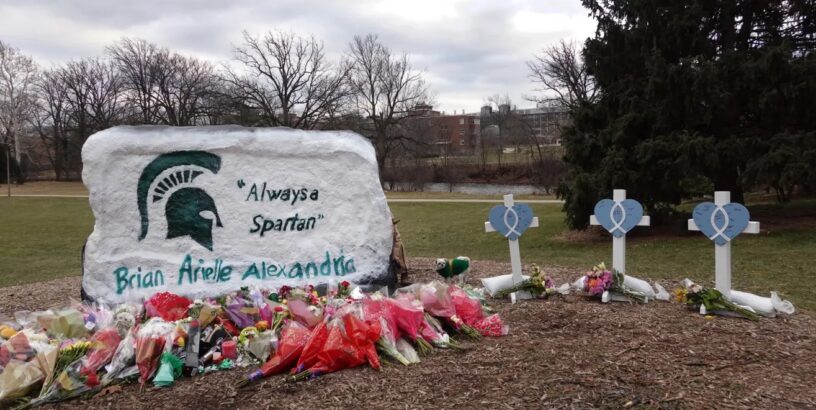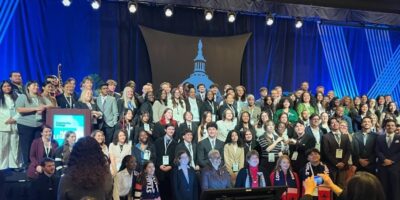Note: This article appeared in the February 21, 2023 edition of Commonwealth Magazine.
Six Degrees of Separation Theory is the notion that every person on the planet is connected to every other person with no more than six relationships between them.
Five days ago, on Monday evening, 43-year-old Anthony Dwayne McRae shot and killed three students and critically injured five others in Berkey Hall and the Student Union on the campus of Michigan State University in East Lansing, Michigan.
As chronicled by the Gun Violence Archive, the horrific rampage at MSU was just the latest in what has literally become a daily occurrence of mass shootings in America: Already, less than ninety hours later, there have been five more with one person killed and twenty injured.
The murders at Michigan State University struck close to home for me, as a father, protective of his children; as a college president, who cares deeply about students; and as a proud alum of MSU.
The day after the killings, Atlantic magazine staff writer Tim Alberta, himself a graduate of Michigan State, wrote “Requiem for the Spartans,” in which he described the campus he had grown to love so much: “Every dream that came to my child’s mind when conceiving of college—the stately buildings and the sprawling green spaces, the roaring football stadium and the whispering river, the camaraderie and the conviviality and the bottomless school spirit—was a reality at Michigan State.”
Too true.
Like Alberta, I have incredibly fond memories of my time at Michigan State University, and still enjoy the community of fellow grads everywhere, so instantly recognizable and interconnected.
I travel a lot, and anywhere I have visited around the globe, from Australia to Qatar to Tanzania, I am bound to pass someone in the street wearing a green t-shirt or ball cap with that big, blocky, white Spartan letter “S” who shouts a peppy, “Go, Green!” to which I always reply with an equally cheerful, “Go, White!”
Even out in New England, where pro-sports are revered and college games an afterthought, I spend autumn Saturday afternoons listening to George Blaha, the “Voice of the Spartans” announcing Big Ten football games on WJR Radio out of Detroit.
I once had a dog named Sparty.
The sites of Monday’s killings at Michigan State University were just across Grand River Avenue from my off-campus house on Ann Street in East Lansing.
I taught a “United States and the World” history class in Berkey Hall, steps away from Room 114, where Assistant Professor Marco Díaz-Muñoz was teaching a seminar on Cuban cultural identity when McRae stepped into the room and opened fire on his students.
My degree from MSU, my lifetime membership in “Spartan Nation,” my memories of that magnificent campus, my classroom in Berkey Hall, and the countless Saturdays I have spent singing the “Michigan State Fight Song” and cheering my team are still a few degrees distant from Monday’s horrific murders.
I was nearly a thousand miles and almost thirty years away.
But my heart aches for my fellow Spartans Arielle Anderson, Brian Fraser, and Alexandria Verner, for their families, for the injured students, and for all of the survivors at MSU whose lives are forever changed by one more act of senseless killing.
This is not the first time I have written about horrible mass shootings.
More than a decade ago, when my own daughters were still quite young, I held them closer and wept with parents everywhere after a gunman murdered twenty children and six teachers at Sandy Hook Elementary School in Newton, Connecticut.
Back then, I somewhat naively wrote, “In the individual and collective soul-searching that is taking place in the wake of Sandy Hook, important questions are being asked, and some bold statements made, about individual rights and responsibilities, mental health treatment, and gun ownership in America. Whatever your position on any of these issues—and particularly if you are not sure of it—now is certainly the time for reflection and, perhaps this time, action.”
Just last May, ten years, 3,448 days, and more than 3,500 American mass shootings later, I found myself pleading after a gunman murdered 19 children and two adults at the Robb Elementary School in Uvalde, Texas that, “We need a new generation of thinkers to solve this problem, because this generation has clearly failed.”
It took me five days to write this, in part, because I was just numb, and the words wouldn’t come to me.
The no more than six degrees of separation we all now have to gun violence in America seem to be getting closer, scarier and sadder.
Unless we throw out the tired, ineffective old playbook, move beyond today’s intensely polarized politics, discover the common ground in our common humanity and take real action to end mass shootings like the one at Michigan State on Monday, I wonder how long it will be before six degrees become only two or one, or none, for all of us?






